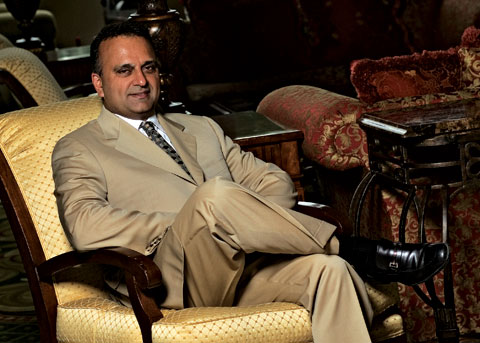Gencom was one of the first companies responsible for making the Ritz-Carlton brand break its tried-and-true mold, which had become irrelevant and passé.
Leave it to Karim Alibhai to dream of a Ritz Reserve brand, a Ritz-Carlton hotel that is even more exclusive than the current Ritz incarnations that dot the country in select locales. Alibhai has always dreamed on a grand scale. In his native Kenya, his family was in the trading business before moving into cotton oil manufacturing. When they arrived in the U.S. in the early 1980s, they settled in Texas and acquired a Best Western motel that was challenging at best. Alibhai’s aspirations left him dreaming that he would one day open a Holiday Inn.
He tells this tale with a small smile, explaining that when his family did open their first Holiday Inn, they indulged in a three-day celebration. We are sitting in the lobby of the Ritz-Carlton Key Biscayne, Miami’s only AAA Five-Diamond resort. Alibhai’s Gencom, an investment firm that specializes in hospitality and real estate sectors, owns the property. A quick glimpse around the tranquil oasis located mere minutes from downtown Miami goes to show just how far Alibhai has come since the humble beginnings in Texas. Since its inception in 1987, Gencom-led partnerships have invested more than $1.5 billion in 10 luxury resorts and hotels with the combined price tags of these projects nearing $6 billion.
In reality, it wasn’t too difficult for Gencom to imagine making the jump from the Holiday Inns of the world to the luxury realm. Alibhai explains, “[At Gencom], we are big believers in the luxury class in the long-term, especially because they had significant barriers to entry. It is not like anyone can jump in and work in this business. It’s all very complex. The sun, moon, and stars all have to be aligned to get everything done right.” It seems as if they have been lined up for Gencom since the beginning. After Alibhai got what can be considered a doctorate in hospitality from running his family’s hotels in the ’80s, he knew the business from the ground up and had determined the formula for making a successful brand. And thus, he set his eyes on Miami, where, “there is no real barrier to entry. Anywhere, you can get permits, rent a piece of land, and go build,” he explains. And that was what they did.
Gencom was one of the first companies responsible for making the Ritz-Carlton brand break its tried-and-true mold, which had become irrelevant and passé. “In the ’90s, when you went to a Ritz in Boston or a Ritz in Cancun, you got the same feel,” says Alibhai. “That was the philosophy then, but I believe the customer wants to feel like they are not in a rich, dark setting.” Although it took some debate to make the Ritz-Carlton bend its normal brand status, the positive effect of Gencom’s out-of-the-box thinking is apparent at most Ritz properties nowadays, regardless of Gencom ownership. Each Ritz-Carlton, while still embracing the same philosophy of unsurpassed service, has its own vibe. Nowhere is this more evident than at the Key Biscayne hotel and residence center. The property is an oasis of calm and light, with a golden glow throughout the hotel. This unique feel holds true at each of Gencom’s properties, which include Ritz-Carlton, Key Biscayne and the Ritz-Carlton Key Biscayne Residences; the Ritz-Carlton, Bachelor Gulch, a destination resort nestled in Beaver Creek Mountain in Colorado; and the Ritz-Carlton, Philadelphia. “For example, this [Key Biscayne] has a casual elegance look, the Bachelor Gulch project is a log cabin, and the Philadelphia Ritz is an old bank building. Our projects are made to be distinctive in reference to their environments.”
Alibhai got involved with the Ritz-Carlton brand over what he refers to as a cocktail conversation. In 1995, Gencom had acquired 50 percent interest in a prominent hotel in Coconut Grove. “We started studying the history, demographics and success of the destination and other resorts,” and it was at that time that Gencom opted to fly the Ritz-Carlton flag, a decision they have not regretted. “We have a very good working relationship with the Ritz,” Alibhai explains. “They deliver for us and we deliver for them.”
In general, what separates Gencom locales from their contemporaries is the luxury residential component, which is a signature element of many of Gencom’s projects, one that evolved almost accidentally. Alibhai explains, “We sort of ran into it when we were working on the Bachelor Gulch projects,” which opened in 2002. “We did a small combination of condo/hotel/residential to make the hotel returns we needed to make it work.” The property was an immediate success, quickly selling out the 89 hotel/condo units.
Armed with this new formula for success-the residential portion of the property funds the construction and upgrades of the hotel sector-Gencom has since included a residential component in many of their new projects. Most recently, the Philadelphia Ritz-Carlton, which is housed in a historic former bank that was built as a replica of the Pantheon in Rome, has begun construction of a residential aspect. While the hotel opened years ago, Gencom is reinvesting capital through the expansion of the residences, which is allowing the property to upgrade other factors such as the restaurants and spa and fitness center.
The same idea has been applied to the Ritz-Carlton Kapula in Maui, where they recently announced more than $176 million in condominium sales in one single day, despite an overall challenging U.S. market. Prior to being acquired by Gencom in 2006, the property was in major need of upgrades, because the previous owners were not able or willing to invest the capital needed to bring it up to today’s standards. “We repositioned the asset,” Alibhai explains. “It has recently reopened and has the best rooms in Hawaii by far, but what drove the hotel to succeed was the residential part.”
Recently, Gencom has set its sights on the Caribbean. Gencom is developing Molasses Reef, a first-of-its-kind project that will operate as the aforementioned Ritz Reserve brand. It is located on a 6,000-acre private island in the Turks & Caicos archipelago. The low-density hotel and spa is on track to compete with the One&Only and Amanresorts brands, as Molasses Reef will appeal to the luxury-savvy international traveler looking for a unique indulgent experience in the islands. “While other resorts are under construction in the Turks & Caicos, none of them offer the amenities that we will include,” says Alibhai. The initial phase, which will open within a year, includes 125 guestrooms and suites alongside beachfront cottages, with plans to develop condominiums, custom-built homes, and a world-class marina. The Ritz Reserve concept will be brought to additional locales throughout the globe.
Elsewhere in the Caribbean, Gencom is developing the Ritz-Carlton Rose Island and the Residences at the Ritz-Carlton, Rose Island, Bahamas. This private island, just minutes from Nassau, will incorporate 157 rooms with a very high suite-to-villa ratio. This project will be completed in two-and-a-half years. With success imminent in the Caribbean, Alibhai has turned his eyes to Mexico and Latin America, as well as India. “In five to seven years, you should see us there,” he says.
While the Ritz brand has been the dominant brand in Gencom’s portfolio, Alibhai expects to expand within the coming months to include a Four Seasons or two. “There isn’t really a conflict between running both brands, because Gencom doesn’t operate them from day-to-day,” he explains.
Despite such an expansive portfolio, Alibhai manages to take the time to disconnect, whether through tennis at the Key Biscayne’s courts or in the yoga studio in Gencom’s office. The time he takes to clear his mind certainly helps him stay calm in today’s turbulent market. Although with so many projects in the works, Alibhai isn’t worried. “We are feeling [the effects of the market], but the luxury end hasn’t been as affected as other secular markets have,” he states. “There’s a lot of wealth that has been created over the last 20 years, and second and third home buyers are still there. It’s a little tougher today in terms of negotiations, but they still want to live in these unique lifestyle projects.” It also helps that in Philadelphia, there has always been a steady market that never skyrocketed as the Miami market did. And in Turks & Caicos, the Ritz Reserve brand is one of the few that have already broken ground. “So when a buyer today says ‘how soon can my house be delivered?’ we can deliver.”
It is this delivery that separates Gencom from its competitors. The company prides itself on being able to partner with major institutions and local partners, depending on what the situation might require. With six properties currently under development and more in negotiations, Gencom is making an indelible mark on the hospitality and real estate sector, one that will continue to prosper through these turbulent times.





















